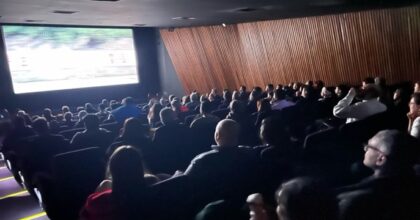Advocacy in Australia
Abduweli Ayup in Sydney, Adelaide, Melbourne
July 19 -30, 2024
Overview
In collaboration with the Melbourne Documentary Film Festival (MDFF), the Australian Muslim Film Festival (AMFF), Uyghur community partners, members of civil society, and the press, All Static & Noise screened in Sydney on July 21, Adelaide on July 23 and 24, and Melbourne on July 27 and 30. Additional activities organized by the Uyghur community made for an impactful week of programming in Australia.
Outcomes from the programming were numerous. In Sydney, New South Wales (NSW) state member of parliament Lynda Voltz will work with the Australian Uyghur Association (AUA) to screen the film on October 17 at the NSW Parliament and invite Members of Parliament, other Consulates, and media to further Uyghur advocacy in political circles. In Adelaide, federal Member of Parliament Tony Zappia pledged to host and chair a Uyghur Parliamentary Friendship Group, creating a new mechanism for advancing Uyghur objectives at the federal level. In Melbourne, the Turan Association offered to support screenings in Turkey and with Turkish associations in the United States so as to advance the Uyghur cause among Turkish communities in the absence of Turkey’s government action.
In-person engagement amounted to 564 people and an estimated 595,025 by media reach. This latter number was calculated by a conservative 1% of the combined total of subscribers to each media outlet that covered the film screenings in Australia. The films’ social media analytics showed the following: X 36,192 views; Instagram 33,590 views; and Facebook 1,442 reaches.
A schedule of activities, list of media engagements and organizing partners are included in attachments.
Successful Engagement with Australian Elected Leadership
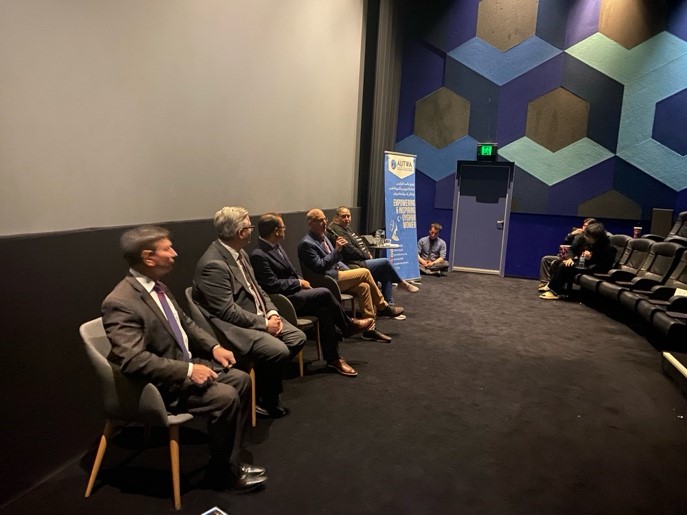
According to AUTWA, “the biggest outcome from the Adelaide screening was that federal Member of Parliament, Tony Zappia agreed to chair and host a Uyghur Parliamentary Friendship Group. During the post-screening discussion, film director David Novack challenged Mr. Zappia equivocation on the complexities of foreign policy and economics with the comment that the world was able to shut down the global economy over a virus and should be able to take the economic risk to advance human rights and end slave labor. By engaging politicians (MP Tony Zappia and SA MP Michael Brown) and Dr Katherine Christ (Sustainable Business Lecturer at University of Southern Australia) on the panel in Adelaide, audience members benefitted from the nuanced discussion of the political and economic challenges surrounding the Uyghur issue and the larger threat of GOC influence in Australia. The convening function of the screening and discussion was instrumental in solidifying the establishment of the Friendship Group.
In Sydney, New South Wales (NSW) state member of parliament Lynda Voltz will work with the Australian Uyghur Association (AUA) to screen the film on October 17 at the NSW Parliament and invite Members of Parliament, other Consulates, and media to further advance Uyghur advocacy in political circles.
The Economics of Oppression
Economics appeared in all film-related discussions. The team reinforced messaging on the need for clean and transparent supply chains during post-screening exchanges (especially when viewers asked how they could help) and in media interviews. The United States Uyghur Force Labor Prevention Act (UFLPA) was invoked as a model for what legislators can do to keep products made with Uyghur forced labor out of U.S. markets. Expanding this model to other countries is a noted best practice. After an attendee at the Art & Advocacy event suggested that the UFLPA was just a political initiative with little impact, an Australian Uyghur defended the UFLPA as an example of how civil society organizations can influence the legislative process in the United States and how this piece of legislation has actually been quite effective in blocking the entry of products made with Uyghur forced labor into the U.S. market. This exchange generated further discussion of the role of civil society in transparent and participatory governance.
Challenging Chinese Government Influence Outside its Borders
Exposure to what is going on in the Uyghur region of China (through screenings and other activities) gave Australians an opportunity to reflect on China’s influence within its own borders and the vulnerability Australia faces with China as its biggest trading partner. Programming around the film gave rights-minded actors outside the U.S. Government opportunities to reinforce U.S. Mission priorities and build strong alliances with people who share democratic values while strengthening efforts to preserve international law and human rights. Abduweli, panelists on post-screening discussions, and members of the Australian Uyghur community were able to reinforce concerns about the Chinese governments growing influence abroad.
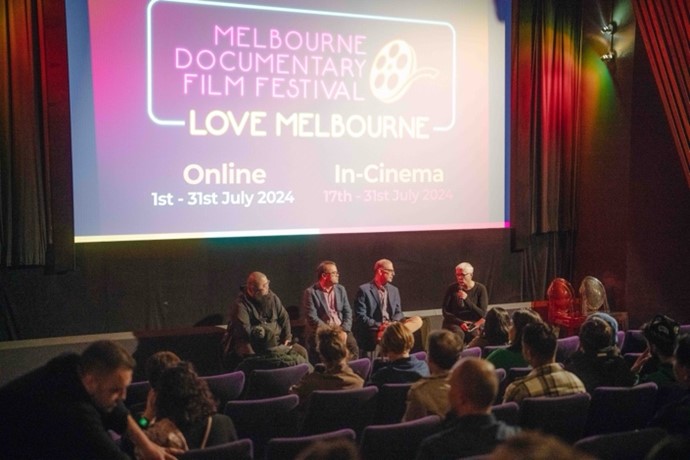
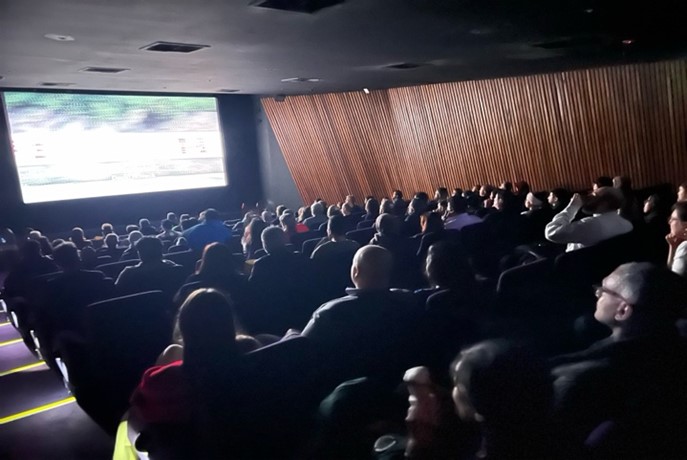
Open discussions with members of the Uyghur and Han communities who provide first-hand accounts of Chinese governments threats in Australia is a powerful medium for communicating the real threat of Chinese extraterritorial influence in Australia. The need for legislators to take action to mitigate this expanding vulnerability was reinforced when MP Tony Zappia agreed to chair the Uyghur Parliamentary Friendship Group.
A big concern expressed by the Uyghur community regarding GOC interference in Australia towards the Uyghur community relates to the issuance of visas to Uyghur family members. According to the President of the Australian Uyghur Association, “China began granting visas to Uyghur people in Australia so they can return to the homeland and later return to Australia. The longing to see family is so strong that this practice effectively silences the Uyghur community from speaking out against the Chinese government’s treatment of the Uyghur people and keeps them from participating in any events that might be perceived as anti-China.” In light of these concerns, having “outsiders” like Abduweli and David lead discussions with already openly public Uyghur organizations provided “cover” to vulnerable community members while creating space where the GOC’s malign practices could be exposed and the victims of this pressure could feel supported. Additionally, members of the Uyghur community received free tickets to the screenings that were managed by members of their own community to help avoid identifying attendees’ personal information online.
The film prompted discussions about both the technological surveillance state present in the Uyghur region and the cyber intrusion that diaspora and other communities outside of China experience. Uyghur community members expressed concerns they have about Chinese security forces in Australia. One representative from a Uyghur organization shared that transnational repression and foreign interference by the GOC has real consequences in Australia. “It compromises our democracy and intimidates and harasses our Australian citizens. Anyone who speaks against the CCP regime is subject to intimidation.” Several people in the audiences expressed surprise that the atrocities in the Uyghur region were so widespread and that Uyghur people in Australia felt threatened. In response to questions of “what can I do,” speakers pointed consumers to behavioral choices and the purchase of products sourced from clean supply chains.
The film also helped counter GOC propaganda by providing opportunities to discuss China’s disinformation campaigns and their malign influence, themes that are present throughout the film. For example, the film highlights the use of Chinese government propaganda to vilify Muslims and Uyghurs. In addition, the film’s title All Static & Noise is taken from a Chinese government official’s statement that Uyghur and other ethnic Turkic people are “all static and noise and must be eliminated.” One image (below) from the film illustrates this point, with “static and noise” written across the ax.
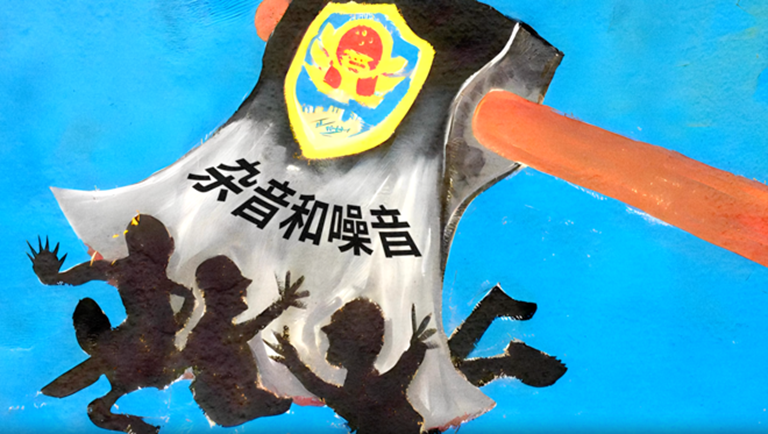
Targeted Outreach to Muslim and Turkish Diaspora Yields Results
The program team engaged Muslim diaspora communities to counter the silence exhibited by predominantly Muslim countries and the government of Turkey on Uyghur atrocities. Because of the close ties Uyghurs have with Turkey and the government of Turkey’s resistance to publicly challenge the GOC on its treatment of the Uyghur people, these connections proved to be meaningful in the moment and promising for the future. As a result of these encounters, the President of Turan Association offered his support to screen the film in Turkey and in the U.S. through Turkish Associations. He committed to working with contacts he has at SBS to try and get the film broadcast within Australia for greater exposure of the Uyghur issue among the general population.
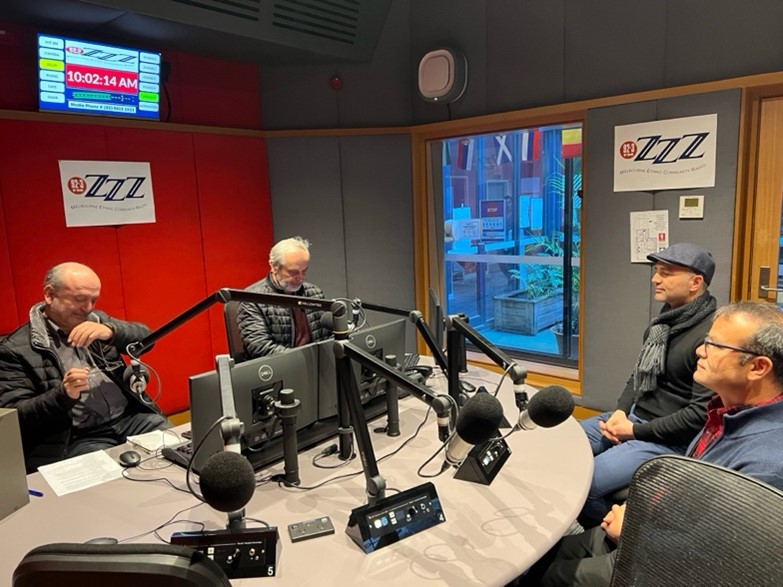
Sydney, Adelaide, and Melbourne screenings brought the Uyghur cause to the attention of the Muslim diaspora communities. In Sydney, Abduweli’s delivery of an account of his experiences at a Mosque generated a sympathetic and warm reception that led to further collaboration. In Adelaide, AUTWA arranged to have the Director of the Muslim Film Festival join the screenings and formally present to Abduweli and David the award for best Feature Documentary that All Static & Noise won at the festival in 2023. This festive engagement brought members of the Muslim Film Festival and other Muslim people into the Uyghur social space and generated plans for follow-up advocacy programming. Organizers in Melbourne worked closely with the Muslim Student Association to engage them with the filmmakers and members of the Uyghur and Han Chinese community at the pre-screening talk on Art and Activism and at the screenings. At a time when all eyes are on Gaza, the Uyghur community was very pleased to have the attention of young Muslim influencers. A representative from the Uyghur community shared his belief that the film and “art talk” was appealing enough to “bring them (the students) out on a weekend.”
Abduweli’s ability to speak Uyghur, Mandarin, and Turkish facilitated connections among these language-speakers. Abduweli was interviewed on Turkish radio and by a Mandarin News Agency. See attached press summary for links.
Artistic Approach Offers Fresh Perspective in Time of Crisis Fatigue
Association with the MDFF and the AMFF demonstrated the film’s legitimacy, offered audiences trusted sources of information about atrocities being committed by the Chinese government, and motivated viewers to question the Chinese government’s behavior in Australia and take action to counter this growing threat.
David’s expertise in film and knowledge about the plight of the Uyghur community and the GOC’s extraterritorial policing efforts within Australia balanced Abduweli’s first-hand testimony with context and an academic level of thoroughness that critical audience members appreciated. David’s experienced-filmmaker persona brought a level of intrigue to these communities and an excitement to engage in ways new to standard forms of advocacy.
MDFF and the Australia’s Uyghur community facilitated press coverage that began before the team landed in Australia, resulting in 10 published articles, 1 radio program, and 1 television broadcast. Two articles are yet to be published and one podcast has yet to be aired. This press coverage was amplified on the film’s social media platforms for larger visibility.
Press coverage was even greater among Film and Entertainment, Falun Gong, and Turkish outlets. Even though the team had close contact with an ABC reporter through Badiucao, the team has reason to believe that his editors did not approve of him covering the story. The Uyghur community arranged an Epoch Times interview that yielded an article in English, Portuguese (with distribution in Brazil), and Vietnamese. A Mandarin TV station also picked up the story. A list of press coverage is included as an attachment.
